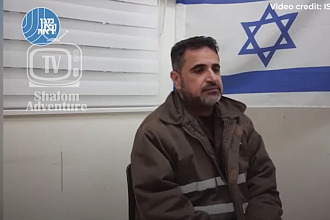Imagine that you cannot talk. You know what you want to say, but your speaking muscles are paralyzed because of a stroke, nerve disease or other medical condition.
...Researcher Ariel Tankus ... has spent two years working on a complex brain-machine interface that could give the power of speech to people unable to express themselves.
This super-advanced technology would articulate letters or words by decoding brain activity triggered by the patients thinking of the sounds they wish to make.
But how to find volunteers for such a study? A perfect opportunity presented itself at UCLA Medical Center. ...
"We explained what these experiments aim to accomplish, and the vast majority were very willing to help us develop technology to help paralyzed persons in the future," says Tankus.
...He instructed volunteers to say a vowel sound... every time they heard a beep. By synchronizing the software on his laptop with the neural recording equipment already hooked up to the patient, Tankus recorded brain activity accompanying each "beep-ah-beep-ah" sequence. He also recorded activity when the patient said a consonant-and-vowel syllable.
Next, he coded the data so the software could predict — based only on brain activity and not a sound recording — what sound the person spoke. Sure enough, when a patient said "ah," the computer played back "ah."
...The researchers mapped out the mathematical arrangement of how the various vowel sounds are represented in areas of the brain, connecting the brain representation with the anatomy and physiology of vowel articulation.
In the next stage, the brain-machine interface predicted and played back a vowel sound that the patient thought about after hearing the beep, but did not utter out loud. Tankus reports that the patients were "surprised that they managed to make the computer speak instead of them."
...Tankus and his research partners plan to bring the electrode technology to Tel Aviv's Sourasky Medical Center to serve epilepsy patients in Israel, and at the same time offer them the opportunity to be part of continuing experiments with the brain-machine speech interface
"There are diseases in which the patient's entire body is paralyzed; he is ...unable to communicate with the environment, but his mind still functions," explained Shoham, .... "Our long term goal is to restore these patients' ability to speak using systems that will include implanting electrodes in their brains, decoding the neural activity that encodes speech, and sounding artificial speech sounds."
Read full article here
Posted on Shalom Adventure by: Brenda Miller
Come join us for an exciting trip to Israel in 2014. For more information, click here

























